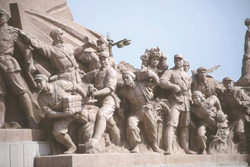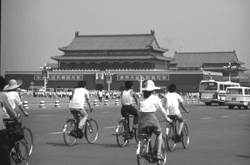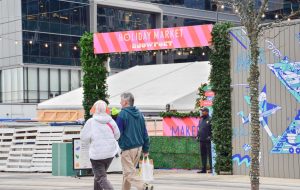Travels From A “Broad”

www.arttoday.com
A monument in Tiananmen Square
July 17, 2002
Mimi Yeh, last year’s Mass Media Arts Editor and an intrepid world explorer, recently jetted off to that land of fabled exoticism, China, to get in touch with her roots and experience a little Eastern hospitality. She reports to us via the fabulous world of Internet technology from deep within the mysterious heart of the Orient. For those of us who consider a T-ride to Revere Beach an excursion into the uncharted territories of the world, Mimi’s trip is quite the exciting adventure. What is she up to and just what is it like over there, you ask? Well, let’s ask Mimi herself. What’s it like over there, Mimi?
The humidity is intense and I sweat, even as I write this. I’m in China right now, having just arrived not two hours ago. We are in the suburbs of Beijing, so it is relatively quiet and safe to walk around. However, that is the last thing I feel like doing right now.
I have been traveling since 6am Monday morning. Seeing as how it is 12 hours ahead here, my circadian rhythms are a bit off. As we drove from the airport, I realized that it had been about seven years since I had come to China. Although I’ve been to Asia about seven times now, counting this one, I never can get over how much it changes each time I come back. Not only is it more built up, but the city is more westernized than ever.
The worst leg of the trip was from Seattle to Tokyo. The duration of the flight was 10 hours and I nearly went crazy trying to entertain myself. I managed to finish John Irving’s latest novel and get partway into Ayn Rand’s Atlas Shrugged. I’m pretty jet-lagged between switching time zones and falling asleep at odd hours.
My father and I are making this trip together. He wants me to understand more about my roots and the people I come from. I am half Chinese. My mother is German/Swiss and my father is Mandarin Chinese. During this trip, I will hopefully learn more about my heritage.
While making a connection from Narita (Japan) to Beijing, I had a chance to sit beside a fellow college kid currently attending the University of Pittsburgh. He was on his way to see his parents in Beijing. We got to talking and discussed just how much things had changed. Besides that, I found out an interesting fact:
Chinese nationals are not allowed to visit Taiwan. If you know anything about the Cultural Revolution, than you know that about 50 years ago, Chiang Kai-shek and his Nationalist army fled to US-backed Taiwan from now-Communist Mainland China. My father was just a boy of 4 at the time but he remembers fleeing across the border to Hong Kong. It’s been two generations since the chaos began and ended yet diplomatic relations are equivalent to war, with Taiwan claiming to be independent and China preachingthe opposite. The situation is such that one cannot really get a handle on it. Too much pride is involved on both sides.
In a bit of a side note, I think I’m developing an inferiority complex because of the metric system.
In a day or two, I will be off to Xi’an province in northwestern China. That’s where the first dynasty, known as the Ching dynasty, began 2,000 years ago when all of China was united to resemble its present shape. We will see the terra cotta soldiers that were interred within the Emperor’s tomb. Hopefully, we’ll get to drop in on the Forbidden City.
Part Two
I woke up dreaming about spaghetti today, smothered in marinara sauce (the pasta, not me) and wondered why I felt so hungry. It seems that ever since I have arrived, everyone is trying to feed me. So as not to be rude, because hospitality is ever so important, I don’t refuse. This can become a problem with your waistline and wreak havoc with one’s digestion. Suffice to say, I had to skip dinner tonight.
However, I cannot complain. China is a culinary delight from every angle. Although there is some stuff even I would hesitate to approach (i.e. raccoon), I’m willing to try just about anything. Food is ridiculously cheap. Since the exchange rate is 8 to 1, I’m having a hard time swallowing that a bowl of noodles, dumplings-the Asian version of fried dough-and tofu costs just US$3 and that is considered expensive.
Petty cabs, motorized or people-powered bikes can get one anywhere in the city for US$1.40. Watching someone pedal in 85 degree weather seriously makes me re-evaluate just how much I take for granted in the U.S. Today we went to Starbucks and for roughly US$7.50 we bought three medium coffees and two pastries. Kind of makes paying US$4.50 for a damn latte idiotic at best.
We went shopping today and I got another glimpse of life in Beijing. As my Aunt Kay led us through the broken bars of a rusted gate and down a filthy back alley I had to wonder if she’d gone nuts. Michelle, her daughter, shook her head and said, “Trust her.” I shrugged and moved ahead, thankful not to have been mugged. We followed her into the apartment of a beat up building and suddenly, I was enveloped in designer labels and air conditioning. I was not hallucinating. Underground shops like this one exist all over the place and one can bargain down the already seemingly inexpensive (for us) items. I have been to markets like this before in Taiwan, yet nothing had prepared me for the vast network of places here. If you have enough money, you can get anything. Though the color of my skin is somewhat inhibiting because they tend to triple the price, it still remains obscenely affordable regardless.
The city has changed since I was last here, 7 years ago. Although there is a more even distribution of wealth through here, the gap between the poorest and the wealthiest has widened while paradoxically, the middle class has exploded. The wealth that one sees in the cities has to do with the fact that this is where it is situated. It is virtually impossible for those in the countryside to get ahead. My father quoted a statistic: 70% of the population are farmers and 80% of them are unable to read.
Though the economy may be moving towards a more capitalist trend and the government may have released its stranglehold on the population a little, the power of the state is subtle. For instance, a sign at Starbucks, small and innocuous, translates to read, “Please take care of your personal belongings.” Innocent enough but the picture beside it is one of a man saluting.
In The Palace of Harmony and Peace, a Tibetan Buddhist temple, below a picture of Mao Ze-Dong and some llamas, a sign reads, “In May 1951, Dalai lama sent plenipotentiary representatives to Beijing under the influence of positive policy towards ethnic minorities adopted by the Communist Party of China. Negotiations were held between the Central People’s Government and the local government of Tibet. The Agreement of the Central People’s Government and the Local Government of Tibet on measures for peaceful liberation of Tibet was signed. The Tibetan Representatives were cordially received by comrades Mao Ze-Dong and Zhou En-lie, top leaders of the People’s Republic of China.” This is the first time I’ve seen anything written in pure double-speak outside of 1984. I wonder how long the Orthodoxy spent attempting to justify the slaughter of a bunch of nomads and monks. I am an outsider and it is not my place to judge because, in my opinion, many in the U.S. are already too outspoken about countries they feel don’t measure up to their status quo, yet seeing such a blatantly slanted statement strikes me in ways that I can’t understand.
Besides visiting the temple and shopping, I also saw the body of Chairman Mao, on display in Tiananmen Square in the Chairman Mao Memorial Hall. In a way, this is one of the most important parts of this trip. My family was Nationalist and, in so being, had to flee the Cultural Revolution and cross over to Taiwan 50 years ago. This man changed the lives of people like my father and I was curious to see what he would look like.
There were armed guards every 10 feet. You waited in a long line that snaked around the Square and led up the marble steps into a clean-lined marble building with one rectangular pediment stacked upon another. Once inside, you could leave flowers but you were not allowed to take your camera, water bottle, or bags with you. You could not linger beside the body and you had to doff your hat before entering the receiving hall. In the end, you focused on his flag-draped corpse and stared in macabre fascination and tried like all hell not to make eye contact with the guards.
The experiences I have had so far here are incredible. Yet, the locals stare nonstop at my father and I. They can’t seem to make the connection that this man, who looks like one of them, is also my parent. It’s another example of one of those things that we take for granted, besides running water and free speech. Only two people so far have asked about him, inquiring if he is my guide. Then again, I’ve gotten that same response from enough people in the States as well, minus the guide part. I guess a union between two different cultures seems bizarre enough, but my parents are pretty strange to begin with so I don’t bat an eye.
In writing this, I have mentioned just how many differences I’ve found between the U.S. and China but I have yet to say how much alike they seem. Driving into the Beijing is no less difficult than approaching Boston during commuter hours (if anything, it’s worse if you add in the lack of laws, insurance, random people on bicyclers). The walls of the Forbidden City are surrounded by homes and offices, much like Fort Independence on Castle Island. People chat away on their cell phones and hurry about with their daily routines, single-mindedly determined to get as much done as possible.This place couldbe Boston fora number of similarities I see, strange as it seems. Since September 11, with the passage of the Patriot Act, our governments have grown similar in the same eerie ways. What this boils down to is the fact that, despite being an ocean and a half apart, the differences are largely skin deep.
I don’t doubt that this may incite anger from some corners.I respect that the U.S., despite its faults, is capable of changing, something that many governments lack, which makes it such an incredible place. This is just one point of view.
The Great Wall of China











































































